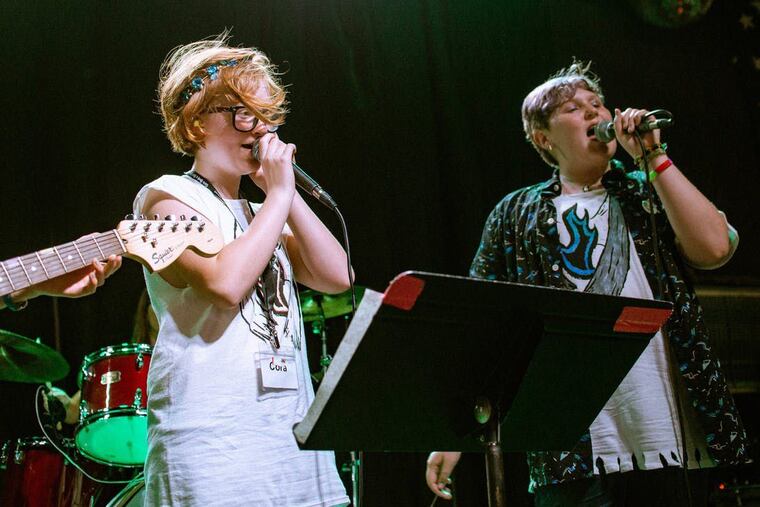Virtual camp helps girls, trans, and nonbinary youth learn to be rock stars
She Rock She Rock was founded in 2007 and is taking a virtual approach this year.

Laura Tahja Johnson of Brooklyn Park, Minn., was driving her second grader Niko home from She Rock She Rock music camp years ago when suddenly a little voice piped up from the back seat.
“‘Mom, do you wanna know what we did today? We ripped up stereotypes,’” Johnson recalled Niko saying. “They literally ripped up magazines of female stereotypes and talked about that sort of empowerment. That’s when I knew that this camp was definitely a good thing.”
Niko and twin sister Ellie Johnson, who both just completed eighth grade, returned to She Rock camp this summer — the seventh consecutive year for Niko, sixth for Ellie — with a major twist. The sessions are virtual due to COVID-19, and the focus is on studio technology instead of rocking out on guitars, drums, and other analog instruments.
“Technology has come a long way in recent years; I’m excited that this is an option,” camp cofounder Jenny Case said. “The cool thing is [campers] can collaborate live [via computer] and they can be put in a band together.”
Case started She Rock She Rock in 2007 because she was trying to put together an all-female band and just wasn’t having much luck with her ads in the alternative weekly newspaper.
Now in its 14th year, the camp serves girls, trans, and nonbinary youth, ages 9 to 18.
This summer, there are four sessions of “Girls Rock ‘n’ Roll Retreat: Studio Edition.” Experience isn’t necessary but a computer is. (The camp has a few loaner laptops as well as scholarships. For information: sherocksherock.com.)
Case, bassist for the long-lived Twin Cities rock band the Flamin’ Oh’s, had been stressing out this year over how to approach camp. But after giving guitar lessons via Zoom from her home during the early part of the pandemic, she is convinced that a similar approach will work.
“We’ll try our best,” Case said. “It’s not going to be perfect, but it’s going to be rock ‘n’ roll.”
That’s one of the points that she and her staff emphasize to campers. “One of our rules at camp is you’re not allowed to apologize for making a mistake,” she said. “You have to say ‘I rock.’”
Besides going virtual, Case and company have made other changes this year, including trimming each day to five hours, but the activities are similar to past incarnations: studying rock history, doing punk-rock aerobics, creating band logos, learning studio technology (instead of playing actual instruments), writing songs, forming a band, listening to guest speakers, discussing gender identity, and examining social justice.
Case thinks learning the studio aspect is important because fewer than 5% of professional recording engineers and producers are “non-men.”
“The kids need to see themselves reflected in the people they are looking up to,” she said. “When they hear a song, do they think about all the stuff that goes on behind the scenes and who is in charge of doing that?”
Niko Johnson, 14, a guitarist-singer-songwriter, is amped about this year’s approach.
“I’m trying to produce my own album this year,” Niko said. “This will be helpful for me to learn music production and mixing and stuff.”
In the aftermath of the killing of George Floyd in Minneapolis, social justice is a prominent component of the camp.
“We do a lot of workshops on activism, media literacy, racism, self-defense, stuff along those lines,” Case said. “When we started, we were very music focused, and we’ve evolved over the years. The social justice piece has always been important, but it got really, really important in the last few weeks. It’s in the forefront of everybody’s mind. I think the kids are going to have a lot to say this summer.”
For Ellie Johnson, 14, the activism aspect of She Rock is appealing.
“That’s one of the big parts of camp, learning what’s going on in the world,” she said, “and how you can try to help your community.”
For Niko, attending She Rock has been life-defining.
“If it weren’t for doing this camp, I probably wouldn’t have figured out my own gender identity,” Niko said.
The twins’ mother said the camp has been a pivotal experience for her children.
“They’ve become more confident as musicians, more confident in their songwriting abilities. They’ve been doing open mic nights [at various venues], and we’ve done live-streamed concerts from our house,” said Johnson, a musician and artistic director of Anoka’s Lyric Arts theater whose musician husband discovered She Rock online.
“She Rock She Rock takes them seriously as musicians and as young people, which is really important,” Johnson said. “The other piece is how they’ve grown as people. To have that confidence in themselves as people in their middle-school years has been a truly amazing thing to watch.”